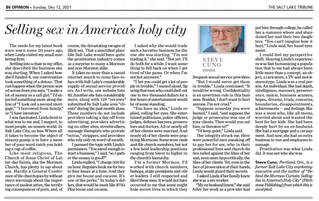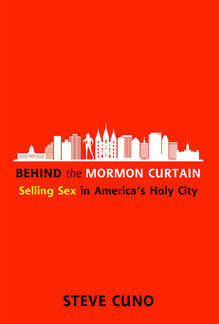 The offending excerpt. Click the image to enlarge. The offending excerpt. Click the image to enlarge. “After reading the excerpt in the Salt Lake Tribune, my wife has discouraged me from reading your book. So congratulations on the book, but it is currently sitting on my dresser.” So wrote a devout Mormon friend after purchasing a signed copy. I was disappointed but not surprised. “I’m sure it is scholarly and well researched and well written,” he continued. “It’s the subject matter that concerns her—and me, frankly.”
Yet it was his closing comment that troubled me most: “You never know what that subject can do to ignite the wrong passions in a man.” Ignite “the wrong passions”? I suppose I could have asked what he meant by that, but I didn’t need to. A former Mormon myself, I knew. He was worried that the book might get into his head, entice him to misbehave, and ultimately interfere with his access to guidance from the Holy Ghost. All of which points to a cultish tactic that I find particularly disturbing. Every cult leader understands, or at least intuits, that curtailing reading — aka keeping people in ignorance — is an effective means of keeping people in line. Hence the pre-Civil War American South criminalized teaching enslaved persons to read, Nazis burned books, and Christian extremists continue seeking to ban selected titles from public and school libraries. The Mormon Church’s approach is a bit more subtle. Mormons simply dismiss any work casting the least shade on their religion as “anti-Mormon,” which is code for “you shouldn’t read this because it could challenge your faith or tempt you to be naughty.” And make no mistake: it is a threat that devout Mormons take seriously. Which is rather revealing, for it tells you something about the fragility of and commitment to faith. Also revealing is that the panic doesn’t go both ways. I would never presume to tell my readers they “shouldn’t” read the Book of Mormon. If you’re a Mormon and you’re worried that reading Behind the Mormon Curtain will shake your faith or lead you into sin, it seems to me that your faith and resolve could do with a good shaking. They will emerge stronger or weaker. Either way, that is all the more reason to read it. ❖
0 Comments
Your comment will be posted after it is approved.
Leave a Reply. |
Welcome to Cunoblog... where I share thoughts about writing. I don’t consider myself a writing authority, but that doesn’t keep me from presuming to blog like one. Oh, and I reserve the right to digress when I feel like it. Archives
July 2024
|


 RSS Feed
RSS Feed